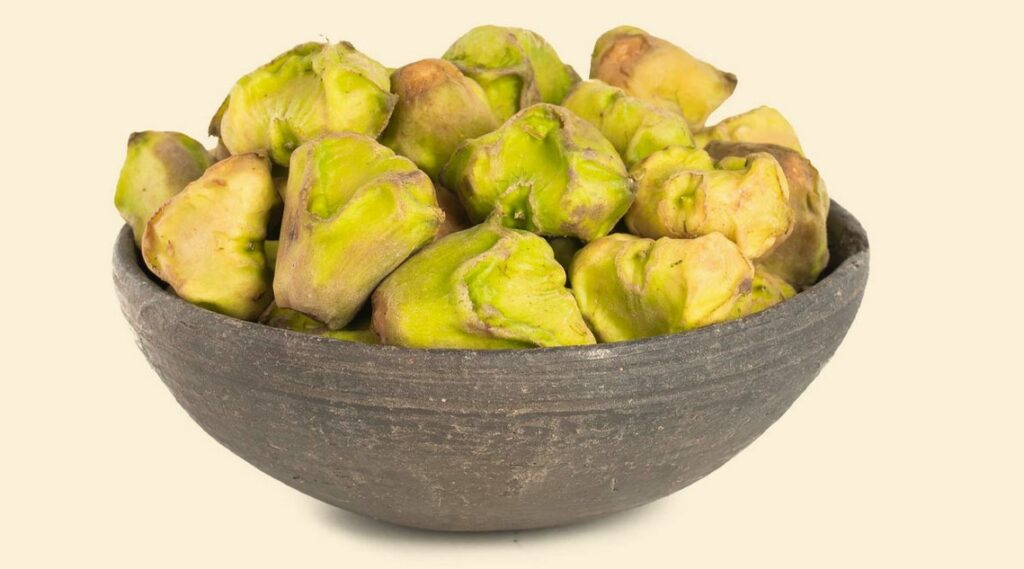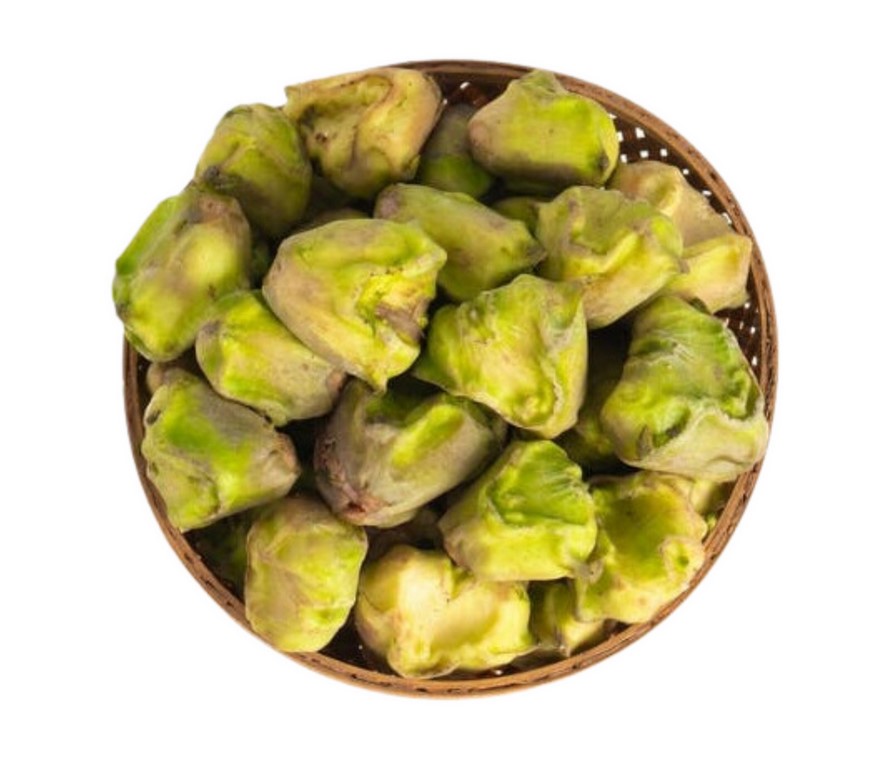Water chestnuts are a unique and nutritious vegetable that offers more than just a crisp, slightly sweet flavor. As a low-carb, high-fiber food, they can be an excellent choice for individuals looking to manage their blood sugar levels, making them a beneficial addition to a diabetes-friendly diet. Known for their crunchy texture and mild taste, water chestnuts are often used in Asian cuisine and can be found in stir-fries, salads, and soups. But beyond their versatility, they also pack a punch in terms of nutrition.
The high fiber content in water chestnuts helps slow the absorption of sugar, which is crucial for stabilizing blood sugar levels. In addition, their low glycemic index ensures that they have a minimal impact on blood glucose, making them an ideal option for people with diabetes or prediabetes. Packed with essential vitamins like B6, C, and minerals such as potassium, water chestnuts support overall health, including heart and muscle function.
So, is water chestnuts good for diabetes? Let’s explore its benefits and practical uses. From blood sugar regulation to essential nutrient support, water chestnuts can be an enjoyable and healthy component of your diabetes management plan.
Overview of Water Chestnuts
Water chestnuts, often referred to as “Eleocharis dulcis,” are small, round vegetables that grow in marshy aquatic environments. Despite their name, they are not actually nuts but corms, which are edible underground stems. Known for their crisp texture and slightly sweet, nutty flavor, water chestnuts are a staple in many Asian dishes and can be used in both raw and cooked forms. They are commonly found in stir-fries, salads, soups, and even desserts, adding a refreshing crunch to various dishes.
Nutritionally, water chestnuts are a powerhouse of vitamins and minerals. They are an excellent source of vitamin B6, which is essential for energy production and brain function, and vitamin C, a powerful antioxidant that supports the immune system and skin health. Water chestnuts are also rich in fiber, which plays a crucial role in digestive health and blood sugar regulation by slowing down glucose absorption. Additionally, they contain potassium, a mineral that helps maintain proper muscle function and blood pressure levels.
Low in calories and carbohydrates, water chestnuts are an ideal addition to a diabetes-friendly diet. Their nutrient profile supports overall health, while their versatility in the kitchen makes them a valuable, tasty food choice for managing blood sugar levels.
Scientific Basis for Water Chestnuts and Diabetes
Water chestnuts have gained attention for their potential benefits in managing blood sugar levels, thanks to their high fiber content, antioxidant properties, and low glycemic index. Although research specifically linking water chestnuts to improved blood sugar control is limited, the nutritional components found in water chestnuts—fiber, antioxidants, and essential minerals—suggest they may play a role in glycemic regulation.
Fiber and Blood Sugar Regulation
Water chestnuts are a great source of dietary fiber, particularly insoluble fiber, which has been shown to help stabilize blood sugar levels. Fiber slows the digestion and absorption of glucose, helping to prevent spikes in blood sugar after meals. Studies have consistently demonstrated that high-fiber diets improve insulin sensitivity and reduce blood sugar levels in individuals with diabetes. By slowing the absorption of sugar into the bloodstream, fiber helps maintain steady glucose levels and reduces the risk of hyperglycemia, making water chestnuts an ideal choice for people with diabetes or prediabetes.
Antioxidants and Glycemic Control
In addition to fiber, water chestnuts are rich in antioxidants, such as vitamin C and flavonoids, which can help reduce oxidative stress in the body. Oxidative stress contributes to chronic inflammation and insulin resistance, both of which play significant roles in the development of type 2 diabetes. By neutralizing free radicals, antioxidants may help to reduce inflammation and improve insulin function, leading to better blood sugar control. Although more research is needed to fully understand the relationship between antioxidants in water chestnuts and blood sugar regulation, existing studies on antioxidant-rich foods suggest a potential benefit for diabetes management.
Low Glycemic Index and Nutrient Density
Water chestnuts have a low glycemic index (GI), meaning they have a minimal impact on blood glucose levels when consumed. Low-GI foods are digested and absorbed more slowly, allowing glucose to enter the bloodstream gradually and preventing rapid spikes in blood sugar. This makes water chestnuts an excellent choice for those seeking to manage their blood sugar levels. In addition to their low GI, water chestnuts are nutrient-dense, providing essential vitamins like vitamin B6, vitamin C, and potassium, which contribute to overall health without causing large fluctuations in blood glucose.
Limitations and Need for Further Research
While the individual components of water chestnuts, such as fiber and antioxidants, are well-studied for their role in blood sugar regulation, there is limited research specifically examining the effects of water chestnuts on diabetes. Most evidence supporting their potential benefits comes from studies on fiber-rich and antioxidant-rich foods in general, rather than from direct studies on water chestnuts. Therefore, further research is needed to definitively confirm the role of water chestnuts in diabetes management.
In conclusion, while current evidence supports the idea that water chestnuts could play a role in stabilizing blood sugar and managing diabetes, more studies are necessary to establish a direct link. The combination of fiber, antioxidants, and a low glycemic index suggests they are a valuable food for people with diabetes, but further research is essential to understand their full potential.

Benefits of Water Chestnuts for Diabetes
Water chestnuts offer several key benefits for individuals managing diabetes, primarily due to their high fiber content, role in weight management, and potential to reduce complications like inflammation and cardiovascular risks.
Stabilizes Blood Sugar Levels
Water chestnuts are rich in fiber, which plays a vital role in stabilizing blood sugar levels. The insoluble fiber in water chestnuts helps slow the digestion and absorption of carbohydrates, reducing the likelihood of sharp spikes in blood sugar after meals. This gradual release of glucose into the bloodstream helps maintain steady blood sugar levels. Fiber also enhances insulin sensitivity, which allows the body to better utilize insulin and manage glucose more effectively. By including water chestnuts in your diet, you can help keep blood sugar levels under control, a key aspect of diabetes management.
Supports Weight Management
Weight management is critical for controlling diabetes, particularly type 2 diabetes. Water chestnuts are low in calories and carbohydrates but high in fiber, making them an excellent choice for a filling, low-calorie food. Their fiber content promotes satiety, helping to curb hunger and reduce overeating. By managing portion sizes and preventing overconsumption of calories, water chestnuts can assist in weight management, which in turn helps reduce insulin resistance and supports better blood sugar control. A healthy weight is key to preventing the progression of diabetes and improving overall metabolic health.
Reduces Inflammation and Cardiovascular Risks
Chronic inflammation and cardiovascular disease are common complications of diabetes. Water chestnuts contain antioxidants like vitamin C and flavonoids, which help combat oxidative stress and reduce inflammation in the body. Reducing inflammation is important because it improves insulin sensitivity and lowers the risk of heart disease, a condition that people with diabetes are at increased risk for. The potassium in water chestnuts also supports heart health by helping to regulate blood pressure, further reducing the likelihood of cardiovascular complications.
Incorporating water chestnuts into your diet can help stabilize blood sugar levels, support weight management, and reduce the risk of inflammation and heart disease, all of which are essential for managing diabetes effectively.
How to Use Water Chestnuts in a Diabetes-Friendly Diet
Water chestnuts are a versatile, low-calorie vegetable that can easily be incorporated into a diabetes-friendly diet. Their crisp texture and mild flavor make them an excellent addition to a variety of dishes, helping you enjoy delicious meals while maintaining stable blood sugar levels. Here are some practical tips for incorporating water chestnuts into your diet:
Use in Salads, Stir-Fries, or Vegetable Dishes
Water chestnuts add a delightful crunch to salads, stir-fries, and vegetable dishes. Toss sliced or whole water chestnuts into fresh salads to enhance texture, or add them to stir-fries with other low-carb vegetables like bell peppers, zucchini, and spinach. Pairing them with lean proteins, like chicken or tofu, creates a well-rounded, diabetes-friendly meal.
Add to Soups or Use as a Crunchy Snack
Water chestnuts are a great addition to soups, particularly vegetable or Asian-inspired broths. Their crunchy texture holds up well when cooked, making them a satisfying ingredient in soups and stews. They can also be enjoyed raw or lightly roasted as a healthy snack. Simply peel and slice them, and add a touch of seasoning for a refreshing, low-calorie snack.
Incorporate into Low-Carb Casseroles
For a hearty and nutritious meal, add water chestnuts to low-carb casseroles or baked vegetable dishes. Their mild flavor blends well with a variety of ingredients, making them a perfect addition to meals that focus on weight management and blood sugar control.
Portion Control and Balance
While water chestnuts are low in calories and carbohydrates, it’s important to practice portion control. A serving of 1/2 cup of cooked or raw water chestnuts is a great portion for most meals. Pair them with lean proteins and healthy fats to create a balanced, blood sugar-friendly dish.
By incorporating water chestnuts into your meals in these ways, you can enjoy their nutritional benefits while maintaining healthy blood sugar levels.
FAQs
Is water chestnuts safe for people with diabetes?
Yes, water chestnuts are safe for people with diabetes. They are low in calories and carbohydrates while being rich in fiber, making them a great option for managing blood sugar levels. The fiber helps slow the absorption of glucose, preventing rapid spikes in blood sugar after meals. Additionally, water chestnuts have a low glycemic index, which is beneficial for maintaining steady blood glucose levels.
Do water chestnuts have a low glycemic index?
Yes, water chestnuts have a low glycemic index (GI), meaning they have a minimal impact on blood sugar when consumed. Foods with a low GI release glucose gradually into the bloodstream, helping to avoid blood sugar spikes. This makes water chestnuts an excellent food choice for individuals looking to control their blood glucose levels.
How much water chestnuts should one consume daily?
A typical serving of water chestnuts is 1/2 to 1 cup per meal, depending on individual dietary needs. This portion size offers a good balance of nutrients without adding excess carbohydrates. When incorporating them into your diet, it’s important to combine them with other diabetes-friendly foods like lean proteins and healthy fats for optimal blood sugar control.
Are there any side effects of eating water chestnuts in excess?
Water chestnuts are generally safe when eaten in moderation. However, consuming them in excessive amounts may cause mild digestive issues, such as bloating or gas, due to their fiber content. As with any food, it’s important to practice moderation to avoid potential digestive discomfort.
Conclusion
Water chestnuts are a nutritious, low-carb vegetable that offers several benefits for individuals managing diabetes. Rich in fiber, they help regulate blood sugar by slowing glucose absorption, preventing spikes in blood sugar after meals. Their low glycemic index makes them an excellent choice for maintaining stable glucose levels. Additionally, water chestnuts are packed with essential vitamins, such as vitamin B6 and vitamin C, as well as minerals like potassium, contributing to overall health.
Incorporating water chestnuts into your diet can help with blood sugar control, support heart health, and offer a variety of flavors and textures to your meals. As with any dietary change, it is essential to consult a healthcare provider to ensure that water chestnuts and other vegetables fit well into your personalized diabetes management plan.
Exploring diabetes-friendly vegetables like water chestnuts can be a delicious and healthful way to add variety to your meals while keeping your blood sugar levels in check. Their versatility in cooking and nutrient density make them a valuable addition to any diabetes-friendly diet.
